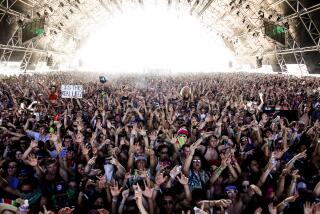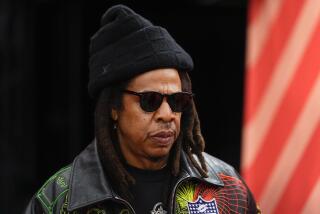A music fest was charging white people double — but caved after the uproar
Tiny Jag has had a really, really long week.
The Detroit rapper, real name Jillian Graham, found herself at the center of a racially charged controversy after announcing to her fans last Tuesday that she had pulled out of a local music festival. Why? She found out it was asking white people to pay twice the amount it was charging people of color.
By Monday morning, the artist, who’s of mixed race, was emotionally exhausted — but also told The Times she feels artistically inspired.
Graham, 27, said she found out by chance that she was on the bill at Afrofuture Fest, a Detroit event slated for Aug. 3 and affiliated with the Afrofuture Youth group. After inquiring as to how the booking happened, she agreed to perform because of her support for another artist on the lineup. She publicly supported the event. And then she found out about the pricing structure.
Early bird “POC” (person of color) tickets were $10, while “non POC” tickets were $20. After the early-bird deadline, prices would double for everyone, to $20 and $40, respectively.
“I gave them the benefit of the doubt that, although I know what ‘POC’ means, I was hoping that maybe it was something different in this case,” Graham said. She asked organizers for answers. “I wasn’t going to assume that that’s what was going on. I just had never even seen anything like it before.”
A spokesperson for EventBrite, which is hosting ticket sales for the fest, explained in a statement Monday that the site doesn’t permit events that require people to pay different prices based on protected characteristics such as race. Afrofuture Fest was asked to alter its pricing model and warned that if it didn’t comply, the event would be delisted.
The pricing structure was revised, and revised again. In one iteration it had reflected a $20 general-admission price, with a box to make a “Non POC Suggested Donation.” A pop-out message had read as follows:
“Events often designed for marginalized Black and Brown communities can be easily co-opted by those with cultural, monetary, and class privileges. Our goal is to ensure that the youth of our communities can participate in the building of a just society; one that promotes EQUITY over EQUALITY. Non-POC individuals are encouraged to provide additional donations as acknowledgement of this historical inequity.”
Afrofuture Fest organizers didn’t respond to The Times’ request for comment Monday, but they did explain the pricing approach on their website. It is unclear how the group intended to monitor whether people had purchased the right ticket.
Afrofuture Youth had a different explanation for changing its pricing, not mentioning EventBrite’s admonitions at all.
“For the safety of our community, family, elders who received threats from white supremacists,& youth who were subjected to seeing racist comments on our [Instagram] pg, Afrofuture Fest has changed our ticketing model to $20 General Admission & suggested donation for nonPOC,” the group said Sunday on Twitter.
Afrofuture Fest’s EventBrite listing now shows only a $20 general-admission ticket.
But a week ago, the answers organizers gave Graham didn’t fly with the rapper, who’s been working the Detroit music scene and beyond for about 18 months. She posted a notice on Twitter explaining her decision to her fans, saying the split pricing structure didn’t “reflect the views of myself or the Tiny Jag team.”
That’s when the hate messages started.
“I began to get a lot of backlash from the supporters of Afrofuture Fest. I know it was very emotional for all of us, so I tried to understand where it was coming from,” the performer and entrepreneur said.
The amount of hate being thrown at Tiny Jag caught the attention of local media, specifically Detroit’s Metro Times, which ran a story Thursday.
“So many people have attacked me for saying [in the story that] I was biracial, because I’m not 50-50. Like, there’s not one parent who’s Caucasian and another who’s black. My mother is a mixed woman; we have a lot going on,” Graham said.
“I care not only because I was raised to care about things like this, but because I actually have the blood in me. … My own family members would be affected by this decision.”
The story jumped to the British press, to the Drudge Report, to urban-focused publications. The backlash was “very eye-opening. Very enlightening for the time that we’re in,” she said.
“As someone who considers my message to be right along with making sure that black people are empowered, that we take agency with our finances and our equity, these are all things that are very important to me,” Graham added. “But I just do not subscribe to this school of thought where in order to make those gains we would have to participate in something like this.”
Graham said a lot of the initial hate messages unfortunately came from her peers. Also possibly fueling the debate is recent political talk about reparations, not to mention Detroit’s history as a predominantly black city.
“I know it’s coming from a lot of frustration because of the socio-economic disparities. It just feels like everyone is just emotionally exhausted,” Graham said. “They’re frustrated, and [the original pricing] was kind of just a bad call and hope for some sort of societal revelation that backfired. And in the midst of that, of trying to protect it, I became a target.”
I care not only because I was raised to care about things like this but because I actually have the blood in me. … My own family members would be affected.
— Jillian Graham, a.k.a. Tiny Jag
She said the messages seem to vary based on where people get their news.
“For example, the more urban outlets that are talking about it, that then gives me a wave of backlash from blacks. Then when it comes from maybe a podcast of a conservative, then I get a huge rush of approval from whites. It really depends on where they heard the story.”
But as far as anyone changing their mind, she’s not seeing much of that yet. “It’s still really fresh, and everybody is still holding their positions no matter what kind of knowledge they’re gaining.”
The irony of the situation, Graham said, is that her work is focused on many of the same concerns that Afrofuture Fest’s website said it was trying to address.
Still, she said, the past week — and she can hardly believe it’s been only a week — will influence her art.
Graham said she’s really focused on making sure the next step is “progressive,” with children and the community in mind. “Because the story has been tweaked ... to make it more acceptable to feel as if I’ve made some sort of turn against my own, when that’s not the case,” she said.
Both hate and support are still flowing in Tiny Jag’s Twitter stream. And she’s dealing with it.
“We’re all flawed humans, and we all get emotional. … Nobody wakes up, like, ‘I cannot wait to show these particular people how unstable I am today,’ you know? I have to at least give them the benefit of the doubt that this was not their intention,” she said.
“Don’t get me wrong, I won’t be tolerating it. But I understand.”
@theCDZ on Twitter and Instagram
More to Read
The biggest entertainment stories
Get our big stories about Hollywood, film, television, music, arts, culture and more right in your inbox as soon as they publish.
You may occasionally receive promotional content from the Los Angeles Times.







